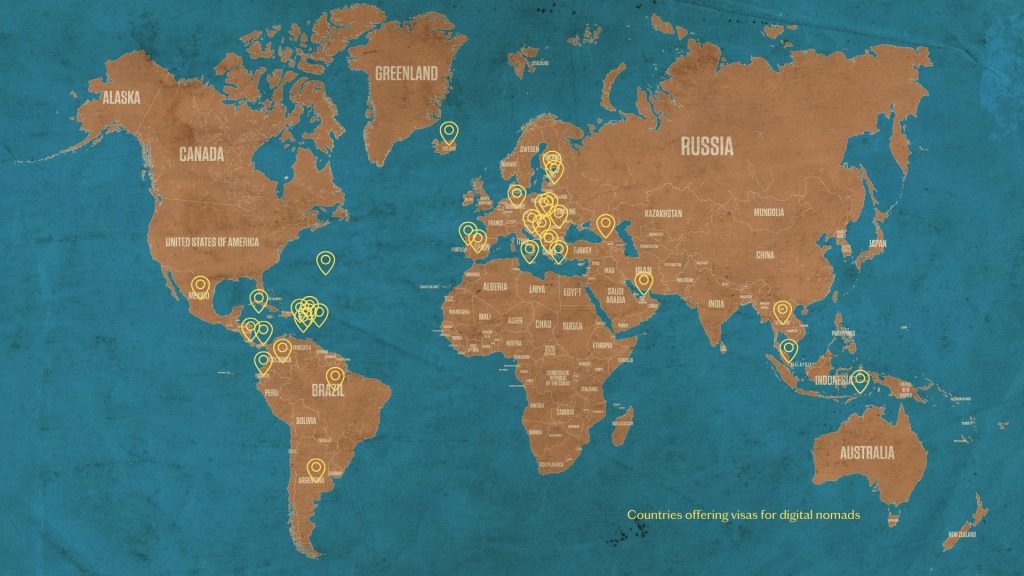Today I measured the laptops I’ve had throughout my working life, from the first to the last one. I confess, I still have some specimens with a monochrome screen, not out of romanticism or fetishism, but to never forget the money they cost me back in the 90’s of the last century!
With the one I am writing about now, I have reached the limit of my ability to reduce the volume of my suitcase when I travel. I am more than satisfied with its lightness and how little the charger takes up – a great design designed for travelers! Along with my smartphone, it is my work tool. Both allow me to work anywhere, no matter how far I am from my home and work base.
So much so, that it even crosses my mind to look for one of those wonderful destinations that many digital nomads shout to the wind. I imagine myself sitting in the fresh air, enjoying the views, while attending to my clients’ requirements, from any beach or city in this great big world.
But is it really that rewarding to be a digital nomad, I guess it all depends on the person and the host destination. It seems that the advantages may outweigh the benefits, as governments around the world are launching campaigns to attract these professionals, encouraged by the benefits they could bring to their local economies. I wonder what disadvantages this way of living and working poses. So I intend to do a little research on it, to see if I make up my mind or finally stay in my rainy, but cheerful and imperfect homeland.
For starters, here are some facts.
Visas for digital nomads in 2024
Estonia launched in 2024 the first visa for digital nomads and since then the number of issues and countries granting them has not stopped growing, reaching 1.2 million in March this year, with a growth over the previous year of 25%. Portugal, Spain and Estonia top the list of European countries with the highest number of visas issued and are growing significantly in Latin American countries such as Mexico and Costa Rica, according to reports from the World Tourism Organization (UNWTO).
Advantages for destination countries
Economic boost, tourism stimulus, skills transfer and international promotion are the benefits that countries point to when offering digital visas. This is something that governments want to take advantage of, encouraged by the high purchasing power that digital nomads tend to have, with the idea that they can boost the local economy or domestic tourism, as many take advantage of their stay to explore the country.
The transfer of knowledge and skills that arise from their interaction with local professionals are equally enriching for the host country. Added to this is an intense free promotion of the destination, stimulated by word of mouth from those who tell their experiences about the stay spreading like wildfire in their digital communities.

Governments are taking this strategy very much into account, encouraged by its economic and innovation potential. I found quite a few positive opinions that corroborate this data, for example, in Portugal, the country that leads the issuance of these visas, where Mariana Vieria da Silva, Minister of State and Presidency, states that “they attract international talent, boost the digital economy and promote innovation in the country”. Along the same lines, the former Estonian Minister of Entrepreneurship and Information Technology, Andres Sutt, describes the implementation of the digital nomad visa in his country as a resounding success, “attracting highly qualified professionals who contribute significantly to our digital economy and startup ecosystem”. For his part, former Costa Rican President Carlos Alvarado says his digital nomad visa program was created as “part of a broader strategy to position Costa Rica as a hub for innovation and sustainability in Latin America“.
The results speak for themselves. By 2024, tourism revenues have increased by 3% on average in countries that have implemented digital nomad visa programs, as highlighted by the World Bank.
And if we talk about the positive and transformative impact they are having on the way we work and travel, we find outstanding opinions that endorse the digital nomad visa policy. For Pieter Levels, one of the pioneers and founder of Nomad List, this type of visa “is revolutionizing the way we work and travel, creating a new paradigm of global mobility that benefits both professionals and host countries”.
Not only do they offer flexibility to professionals, explains Digital Nomads for Dummies author Kristin Wilson, but they “open up new opportunities for cultural exchange and economic growth in destinations.” They are transforming long-stay tourism, asserts Matthew Kepnes, author of the Nomadic Matt blog, as they allow “a deeper immersion in local culture and encourage a more sustainable and meaningful type of travel“. “They create a new kind of global citizenship“, says Bitcoin developer and digital nomad, Amir Taaki, which generates “the birth of a truly international workforce that can contribute to economies around the world.”
And is that most digital nomads agree in qualifying their experiences as unique opportunities, transformative, easy to implement and that bring them high stability, while enjoying the host countries, the balance between work and life, knowing different technological realities and having less costs in breathtaking landscapes.
Tempting, isn’t it? For those of us who work in the creative sector this is a panacea, I don’t know what I’m waiting for! Shall I jump into the adventure of being a digital nomad?

The boom of this policy is also being analyzed by renowned media outlets, which, according to Kali Krause in The Guardian, not only redefine the concept of work and travel, but also “raise questions about social inequality and privilege”. In Forbes it is Natalie Jesionka who believes it is necessary to align the balance of economic benefits with the needs of local communities, while CNBC journalist Megan Leonhardt warns that while these types of visas offer flexibility, workers “should carefully consider the tax and social security implications before packing their bags.”
It seems that some important issues arise before applying for the visa. There are some issues to keep in mind if we don’t want the experience to be rather less impressive and transformative.
Taxation and Social Security for Digital Nomads
If you are considering this life, take a good look at the double taxation agreements between your home and host country and how these may affect your tax situation. The implications are different depending on the country and length of stay. And in the case of health coverage, there are different realities that will force you to carefully research social security agreements to avoid gaps in your coverage.
According to a Deloitte study, in 2023, 68% of digital nomads surveyed reported difficulties in understanding their tax obligations in multiple jurisdictions. The World Bank estimates that more than 40 % of digital nomads could face double taxation issues if the right tax frameworks are not in place. For its part, the OECD notes that only 35% of countries with visas for digital nomads have clear social security arrangements for these workers.
So before embarking on an international remote work trip, be well informed about the tax and social security implications once you arrive at your destination. For my part, I plan to take advantage of this circumstance as much as I can, but with the umbrella of information and security in my accounts and my health. Happy Traveling!
Discover the countries offering visas for digital nomads
Here is a complete list of all the countries that already offer visas for Digital Nomads. I hope you find it useful.
Europe
1. Spain
- Cost: 80 euros for the visa + 75 euros for the residence authorization.
- Procedure: Online or in person at Spanish consulates.
- Processing time: Approximately 20 working days
- Website: Immigration Portal
2. Portugal
- Cost: 75 euros for visa + 90 euros for residence permit
- Processing: Online through SEF portal
- Processing time: 30-60 days
- Website: SEF – Serviço de Estrangeiros e Fronteiras
3. Croatia
- Cost: Approximately 60 euros
- Processing: Online or in person at local police station
- Processing time: 30 days
- Website: Croatian Ministry of the Interior
4. Estonia
- Cost: 100 euros (short term) or 180 euros (long term)
- Processing: Online
- Processing time: 30 days
- Website: e-Residency
5. Germany (Freiberufler Visa)
- Cost: 60-100 euros
- Processing: In person at the German embassy
- Processing time: 1-3 months
- Website: Make it in Germany
6. Czech Republic
- Cost: Approximately 200 euros
- Processing: In person at Czech Embassies
- Processing time: 90-120 days
- Website: Ministry of the Interior of the Czech Republic
7. Iceland
- Cost: 12,200 ISK (approximately 82 euros)
- Processing: Online and in person at the Directorate of Immigration.
- Time limit for granting: 90 days
- Website: Directorate of Immigration
8. Malta
- Cost: 300 euros
- Processing: Online
- Processing time: 30 days
- Website: Residency Malta Agency
9. Georgia
- Cost: Free
- Processing: Online
- Processing time: 10 working days
- Website: Remotely from Georgia
10. Romania
- Cost: 120 euros
- Processing: In person at Romanian embassies.
- Granting period: 30 days
- Website: General Inspectorate for Immigration
11. Montenegro
- Cost: 100-150 euros
- Procedure: In person at local police offices.
- Processing time: 30 days
- Website: Government of Montenegro
12. Cyprus
- Cost: 70 euros
- Processing: In person at Cypriot Embassies
- Granting period: 3-4 weeks
- Website: Ministry of Foreign Affairs
13. Greece
In process of implementation. Expected to be available in 2025.
14. Hungary
- Cost: 110 euros
- Processing: In person at Hungarian embassies.
- Processing time: 30 days
- Website: Immigration and Asylum Office
15. Latvia
- Cost: 100 euros
- Processing: Online and in person at Latvian embassies.
- Processing time: 30 days
- Website: Office of Citizenship and Migration Affairs
America
16. Costa Rica
- Cost: 100 dollars for the application + 90 dollars for the visa.
- Processing: Online and in-person at Costa Rican consulates
- Processing time: 2-3 months
- Web page: Dirección General de Migración y Extranjería
17. Mexico
- Cost: Approximately $40
- Processing: Online and in person at Mexican consulates.
- Processing time: 10-15 business days
- Website: Government of Mexico
18. Panama
- Cost: 300 dollars
- Procedure: In person at Panamanian embassies.
- Processing time: 30 days
- Web page: National Immigration Service
19. Brazil
- Cost: Approximately US$100
- Processing: In person at Brazilian Consulates
- Processing time: 30-60 days
- Website: Consular Portal
20. Argentina
- Cost: 200-300 dollars
- Processing: Online and in person at Argentine consulates.
- Granting period: 30 days
- Website: National Directorate of Migration
21. Ecuador
- Cost: 450 dollars
- Processing: Online and in person at Ecuadorian consulates.
- Processing time: 10-15 working days
- Website: Ministry of Foreign Affairs and Human Mobility
22. Colombia
- Cost: $52
- Processing: Online
- Processing time: 5 working days
- Website: Ministry of Foreign Affairs
23. Antigua and Barbuda
- Cost: US$1,500 (individual), US$2,000 (family)
- Processing: Online
- Processing time: 7 working days
- Website: Nomad Digital Residence
Barbados
- Cost: $2,000 (individual), $3,000 (family)
- Processing: Online
- Award period: 7 business days
- Website: Barbados Welcome Stamp
Bermuda
- Cost: $263
- Processing: Online
- Processing time: 5 working days
- Website: Government of Bermuda
26. Cayman Islands
- Cost: $1,469
- Processing: Online
- Processing time: 7-14 business days
- Website: Global Citizen Concierge Program
27. Dominica
- Cost: US$800 (individual), US$1,200 (family)
- Processing: Online
- Processing time: 7 business days
- Website: Work in Nature (WIN) Program
28. Montserrat
- Cost: $500 (Individual), $750 (Family)
- Processing: OnlineTimeframe
- Award period: 7-14 business days
- Website: Montserrat Remote Worker Stamp
29. St. Lucia
- Cost: $1,500 (individual), $3,000 (family)
- Processing: Online
- Award time: 5-7 business days
- Website: Live It Program
30. Anguilla
- Cost: $2,000 (individual), $3,000 (family)
- Processing: Online
- Time to award: 1-2 weeks
- Website: Anguilla Beyond Extraordinary
Asia and Oceania
31. Thailand
- Cost: Approximately $600
- Processing: Online and in person at Thai embassies.
- Processing time: 15-30 days
- Website: Thai eVisa
32. Indonesia (Bali)
- Cost: Approximately 130 dollars
- Processing: Online and in person at Indonesian Embassies
- Time of concession: 7-10 working days
- Website: Directorate General of Immigration
33. United Arab Emirates (Dubai)
- Cost: $287
- Processing: Online
- Processing time: 5-7 working days
- Website: Visit Dubai
34. Malaysia
Website: DE Rantau Program
Cost: Approximately US$220
Processing: Online and in person at Malaysian Embassies
Processing time: 3-4 weeks


